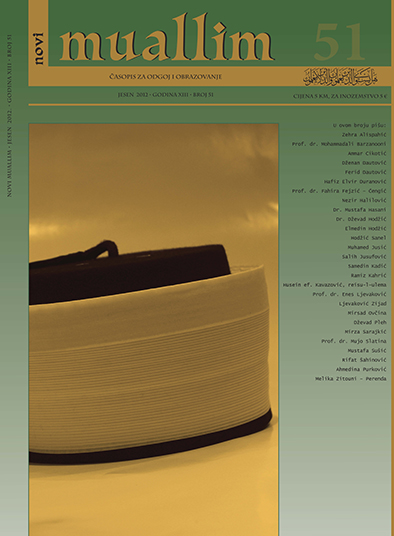UPBRINGING IN THE EARLY AGE – FULFILLING DEMANDS OF HUMAN NATURE
DOI:
https://doi.org/10.26340/muallim.v13i51.451Keywords:
requirements of human nature, upbringing at an early age, spontaneity, self-activity, Educational AnthropologyAbstract
Some recent researches indicate that upbringing in the early age is facing its downfall. What is known as ethno-pedagogical theories of upbringing, which have been acquired over the centuries of existence, are nowadays being replaced by athrapic pedagogy. Educational Anthropology suggests that the reasons for this phenomenon can be found, among others, in the non-fulfilment of the requirements of human (child's) nature. The author of this article argues that early upbringing is a special kind of fulfilling demands of human nature. That is why it is necessary to regard all the requirements of human nature in the process of child development. Recognition and correct interpretation of the signals that a child in his early age is sending is the first requirement for the success of upbringing at an early age. This article emphasizes the significance of pedagogical support of child’s spontaneity and self-activity. In the early age, spontaneity and self-activity should be treated as an anthropological fact, as a manifestation of a requirement of human nature. What is caused by the inner reasons (e.g. learning impulse), what signifies inner initiation is the moving force for the individual development of a child. Early education begins with recognizing child’s movements, impulses and feelings, with recognising his/her reflexive, instinctive and original actions and reactions. Signals that human nature sends must not remain unattended, left without our aid and support. The aim of early upbringing should be drawn from the human nature and the essence of very education, not from something external to it. Educational Anthropology intends to bring together fundamental and general characteristics of human being with principles and methods of education. If it succeeds to fulfil demands of human nature, Educational Anthropology will be able to contribute to resolution of many problems of early upbringing. Only an open and action-oriented Educational Anthropology, that searches for an education that is in harmony with human nature, can function successfully between theory and praxis of upbringing in the early age.
Downloads
Published
How to Cite
Issue
Section
License
Naknada:
a. Časopis ne naplaćuje naknadu za obradu članaka (APC) i naknadu za podnošenje članaka.
Autori koji objavljuju u ovom časopisu pristaju na sljedeće uvijete:
- Autori zadržavaju autorska prava i pružaju časopisu pravo prvog objavljivanja, pri čemu će rad jednu godinu po objavljivanju biti podložan licenci Creative Commons imenovanje koja omogućuje drugima da dijele rad uz uvijet navođenja autorstva i izvornog objavljivanja u ovom časopisu.
- Autori mogu izraditi zasebne, ugovorne aranžmane za ne-ekskluzivnu distribuciju rada objavljenog u časopisu (npr. postavljanje u institucionalni repozitorij ili objavljivanje u knjizi), uz navođenje da je rad izvorno objavljen u ovom časopisu.


